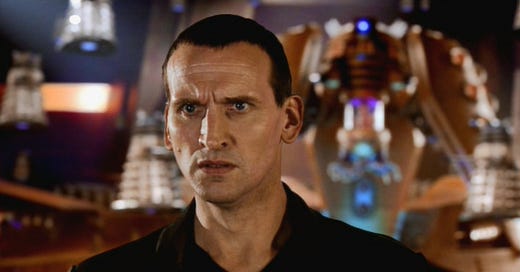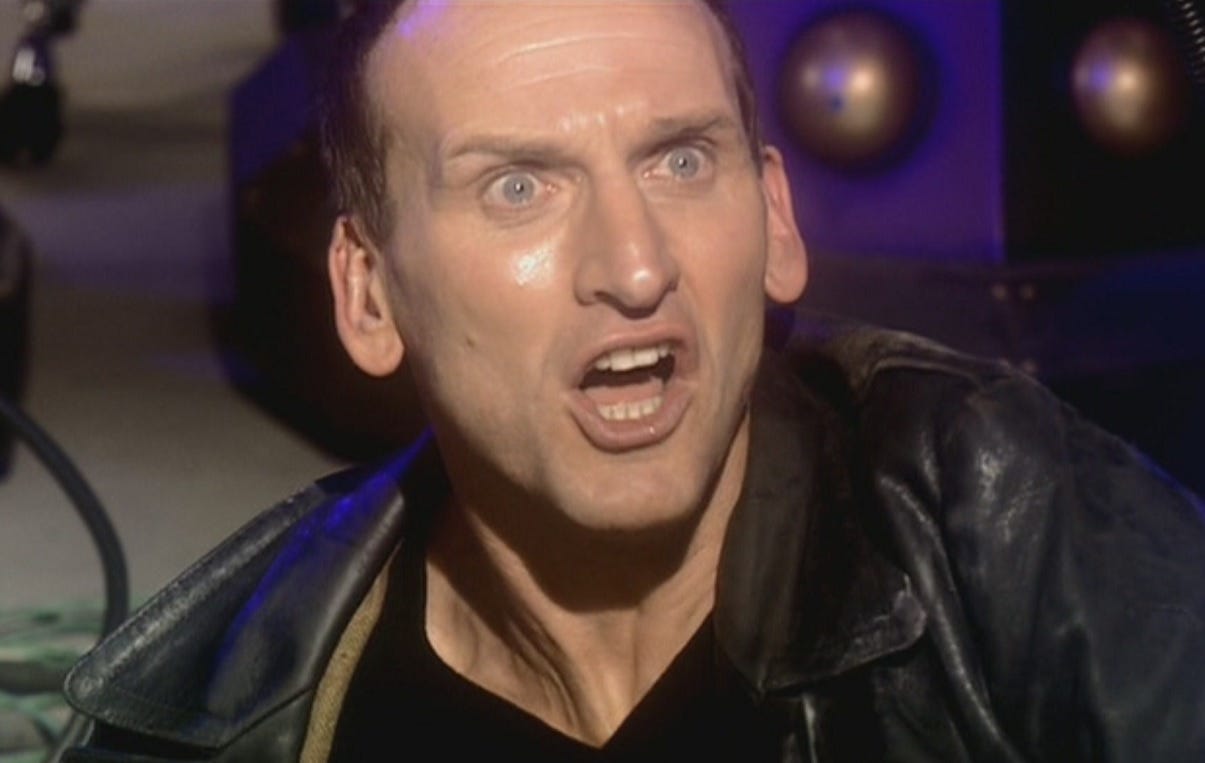Review retrospective: Doctor Who "The Parting of the Ways"
My first look at an old review, and how opinions can change over time.
Hello, and welcome to the first review retrospective. In this edition of Kasterborous, which lands at around 5.15pm every Saturday evening, I’m looking back at an old episode of either Doctor Who or some other fun family sci-fi/fantasy/cult thing that people would tune in for on a weekend.
To kick things off, and because the episode aired just over 20 years ago (I’m out by 10 days), I’m bringing you my review of “The Parting of the Ways,” the 13th episode of Doctor Who’s revival run in 2005…
The past is another country
You don’t need me to tell you how different things were 20 years ago. But in terms of excitement for Doctor Who — well, I don’t think we’ve been anywhere close to this since the 50th anniversary.
Reviewing my archives, I’m reminded that the BBC was letting nothing out after the madness of the Eccleston departure news 12 weeks earlier (an event that closed online forums). On the one hand you had the unprecedented buzz concerning the meaning or identity of “Bad Wolf.”
And then there were the rumours. These were wild, and with David Tennant the only tangible fact about the final episode, my favourite was the notion that Red Dwarf’s Norman Lovett was cast as Davros.
I mean, come on!
So, on June 18th, 2005, “The Parting of the Ways” brought Doctor Who Season 27 to a close. Here’s how I reviewed it that same night…
The Parting of the Ways
“Purify the Earth with fire…The planet shall become MY temple and we shall rise…This will be our paradise!”
When we began the “Trip of a Lifetime” in Rose, little did any of us think it would end this way - Autons, Daleks, Slitheen and Gelth have all been encountered by the Doctor and Rose. Captain Jack has joined the team, and knowledge and equipment has been gained along the way. None of us knew, or could foresee, the magnitude of the threat facing Earth that the Doctor would stumble upon.
Before we go any further – and apologies to any foreign readers – let’s deal with Bad Wolf. The ongoing thread, hidden in places throughout the series (spot the reference in the takeaway this week – didn’t see that one did you?), has taken on a life of its own, demanding media attention and setting Doctor Who discussion forums from one side of the Internet to the other ablaze with opinion, theory and ridicule.
So what actually happened? Was Rose Bad Wolf? Or was the TARDIS Bad Wolf? Or was it a Rose-TARDIS amalgam/gestalt? Whichever it was (probably the latter) that caused the phrase to follow Rose and the Doctor around, it has succeeded in keeping us hooked for 13 weeks and allowed the Doctor’s ninth incarnation to develop away from the one-time destroyer of millions to a true hero.
Thanks to Rose-TARDIS, once again “everybody lives”.
The greatest ever Dalek
The realisation of the Emperor Dalek was frankly breath-taking, and again massive big up credit to the fantastic team at The Mill responsible for the remarkable sense of scale and depth achieved in their depiction of the Dalek mothership.
No doubt debate will rage for some time whether or not the Emperor was a future incarnation of Davros, whether it was the same Emperor as seen in Power of the Daleks, or even if it was the Dalek seen in the episode Dalek… Whoever it was, it was truly fearsome, and the added ingredient to the Dalek repertoire of insanity – religion – was a welcome addition.
Not only had the Emperor shrouded the eyes of Humanity and controlled them with the diversion of televised games on the Game Station, he used religion as a tool to divert his human-derived Daleks; a not-too-shrouded dig by Russell T Davies at other methods of controlling mankind.
In this series we’ve had allegories of corrupt government and war (Aliens of London), allusions to Roswell (Dalek) and digs at the media in The Long Game and Bad Wolf. Whether Russell T Davies wrote any or none of these is irrelevant. He is writing in a voice that has long been missing from television.
In these supposedly more enlightened times, how often do we step back and think about what is happening, what those who represent us (both democratically and autocratically) are actually doing in our name, and in the name of a god that people like them created.
Russell T Davies – and this is by no means to ignore the talents of other contributors to the series - succeeds in writing on two key levels. One is aimed at the populist, soap opera watching viewer tuning in for a glimpse of Billie Piper. The other is one that pulls mirrors out, points them at real life and the world at large, and demands that we question our position both in this world and the Universe.
Davies succeeds here in the same way that the much missed Robert Holmes often did in classic Doctor Who.
All change in the TARDIS
The departure of Captain Jack is one that was half expected, and to be fair his contribution to this final tale was again one of redemption. Hopefully we will see him again – possibly during the missing two years of his life – but his character served its purpose as a foil for the characters of the Doctor and Rose. But now there is a new character in the TARDIS…
Rose’s transformation into sexy vortex-goddess was outstanding, and touching. The Doctor’s departure (he was so good he got to say goodbye twice!) was breath-taking.
I was convinced regeneration could not be achieved on a higher quality than the one that gave us Paul McGann. I had myself believing we wouldn’t see a change, that Rose would leave in the TARDIS and come back to find a man claiming to be the Doctor. I was totally and utterly gobsmacked – having stayed away from the Internet since Wednesday – to see the stunning transformation.
As for the first words of Doctor number ten? I’d like to think they're a hint as to how David Tennant will play the part. But I know we won’t get any hints until filming begins next month.
We’ve got six months until the next episode of Doctor Who. But let’s face it – does that trailer on New Year’s Day seem that long ago, really?
The must-see TV resurrection
After just 13 weeks of watching Doctor Who, the Ninth Doctor was gone. As we’ve seen already, Christopher Eccleston got a really bad deal from the press and fans for his decision to only do the one year – yet the decision had been finalised some months before. In truth, the leak of his departure after a single series and the subsequent announcement by the BBC confirming this was a PR disaster, only mitigated slightly with the premature announcement of David Tennant’s casting as Eccleston’s replacement.
If only it had been kept a secret! The Doctor, Rose and Jack on Satellite Five, facing off with the Daleks, the Doctor and Rose escaping, a shock regeneration – it really could have been so different!
In the end of course, Christopher Eccleston gave a year of his life to Doctor Who, was the focal point of the series return to television and his presence made the series’ resurrection must-see TV.
Retrospective reaction
One of my worst qualities is that I’m a huge fan of my opinions. They form quickly, and rarely change; when they do, I make it clear that I’ve had a change of heart. Fortunately, this is quite rare.
So, while I largely agree with this review 20 years on, I’m guilty of sugar-coating Eccleston’s departure. That the BBC managed to navigate it is creditable, but really, knowing what we know since (concerning working conditions and personal lives), I am increasingly of the opinion that the wrong man walked from Doctor Who in Spring 2005.
We are judged by our actions (whether by our peers at the time, by ourselves in hindsight, and, if you believe, by our creator) but tangible consequences often seem scarce.
And often, the wrong person pays the price. “The Parting of the Ways” is a great bit of television, is superbly executed throughout, and stands up better than many Doctor Who episodes of the past decade.
But I can’t help wondering, with the benefit of context, about what we could have had.
I will be back with another (non-Doctor Who) article in a few days’ time. Until then, please subscribe to the Kasterborous podcast on Spotify, Apple Podcasts, or wherever you get your pods.









I can't stand that people like to spoil new things.
Do they think that they are praised when they spoiled it ?